Mostrar el registro sencillo del ítem
dc.contributor.author
Cappa, Flavio Martín

dc.contributor.author
Giannoni, Stella Maris

dc.contributor.author
Borghi, Carlos Eduardo

dc.date.available
2018-11-21T17:38:57Z
dc.date.issued
2017-09
dc.identifier.citation
Cappa, Flavio Martín; Giannoni, Stella Maris; Borghi, Carlos Eduardo; Effects of roads on the behaviour of the largest South American artiodactyl (Lama guanicoe) in an Argentine reserve; Academic Press Ltd - Elsevier Science Ltd; Animal Behaviour; 131; 9-2017; 131-136
dc.identifier.issn
0003-3472
dc.identifier.uri
http://hdl.handle.net/11336/64862
dc.description.abstract
Animals may divert time and energy in similar ways in the presence of predators, humans or landscape infrastructures. Roads have facilitated the economic and social development of human populations. Nevertheless their presence and human use cause environmental changes, such as clearing, which increase perception of predation risk. Among the responses to this are changes in animal behaviours. In the present study, we sought to assess whether roads in an Argentine reserve affect perception of predation risk by guanacos, Lama guanicoe, through behaviour changes. We analysed the effects of two types of roads (unpaved track and paved route) and their surrounding environment (e.g. vegetation structure) on group size variation and on three behaviours: vigilance, foraging and movement. We also used the group structure of guanacos, such as the number of calves, to explain these behaviours. Roads in the protected area had no impact on the size of guanaco groups. However, individuals in larger groups were less vigilant and foraged more closely to roads, indicating that closeness to roads is less risky for these animals. Although guanacos' time spent moving was not affected by roads, nearness to the unpaved track and high plant cover showed the highest proportions of animals moving in the area, and individuals moved more when in small groups and in areas with medium-height vegetation. The number of individuals displaying vigilance or foraging behaviours was not affected by any of the explanatory variables. Based on these findings, we conclude that guanacos perceive the roadside environment as safer, possibly because open areas adjacent to roads facilitate detection of predators. Knowing the effects of roads on wildlife in protected areas is necessary to find ways to reach a balance between the economic development of a region and conservation of its biodiversity.
dc.format
application/pdf
dc.language.iso
eng
dc.publisher
Academic Press Ltd - Elsevier Science Ltd

dc.rights
info:eu-repo/semantics/openAccess
dc.rights.uri
https://creativecommons.org/licenses/by-nc-sa/2.5/ar/
dc.subject
Disturbance Stimuli
dc.subject
Guanaco
dc.subject
Human&Ndash;Animal Interaction
dc.subject
Predation Risk
dc.subject
Roads
dc.subject.classification
Conservación de la Biodiversidad

dc.subject.classification
Ciencias Biológicas

dc.subject.classification
CIENCIAS NATURALES Y EXACTAS

dc.title
Effects of roads on the behaviour of the largest South American artiodactyl (Lama guanicoe) in an Argentine reserve
dc.type
info:eu-repo/semantics/article
dc.type
info:ar-repo/semantics/artículo
dc.type
info:eu-repo/semantics/publishedVersion
dc.date.updated
2018-10-22T17:26:24Z
dc.journal.volume
131
dc.journal.pagination
131-136
dc.journal.pais
Países Bajos

dc.journal.ciudad
Amsterdam
dc.description.fil
Fil: Cappa, Flavio Martín. Consejo Nacional de Investigaciones Científicas y Técnicas. Centro Científico Tecnológico Conicet - San Juan. Centro de Investigaciones de la Geosfera y Biosfera. Universidad Nacional de San Juan. Facultad de Ciencias Exactas Físicas y Naturales. Centro de Investigaciones de la Geosfera y Biosfera; Argentina
dc.description.fil
Fil: Giannoni, Stella Maris. Consejo Nacional de Investigaciones Científicas y Técnicas. Centro Científico Tecnológico Conicet - San Juan. Centro de Investigaciones de la Geosfera y Biosfera. Universidad Nacional de San Juan. Facultad de Ciencias Exactas Físicas y Naturales. Centro de Investigaciones de la Geosfera y Biosfera; Argentina
dc.description.fil
Fil: Borghi, Carlos Eduardo. Consejo Nacional de Investigaciones Científicas y Técnicas. Centro Científico Tecnológico Conicet - San Juan. Centro de Investigaciones de la Geosfera y Biosfera. Universidad Nacional de San Juan. Facultad de Ciencias Exactas Físicas y Naturales. Centro de Investigaciones de la Geosfera y Biosfera; Argentina
dc.journal.title
Animal Behaviour

dc.relation.alternativeid
info:eu-repo/semantics/altIdentifier/doi/https://dx.doi.org/10.1016/j.anbehav.2017.07.020
dc.relation.alternativeid
info:eu-repo/semantics/altIdentifier/url/https://www.sciencedirect.com/science/article/pii/S0003347217302324
Archivos asociados
